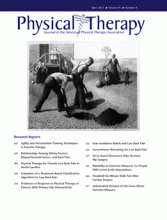Abstract
Background The “gold standard” for measuring gross motor function in children with cerebral palsy is the 66-item Gross Motor Function Measure (GMFM-66).
Objective The purpose of this study was to estimate the validity and reliability of 2 abbreviated versions of the GMFM-66; one version involves an item set approach, and the other version involves a basal and ceiling approach.
Design This was a measurement study comprising concurrent validity, comparability, and test-retest reliability components.
Methods The study participants were 26 children who were 2 to 6 years of age and had cerebral palsy across all Gross Motor Function Classification System levels. In the first session, both abbreviated versions were administered by 2 independent raters; next, the full GMFM-66 was administered. In the second session, only the abbreviated versions were administered by the same raters. Concurrent validity, comparability of versions, and test-retest reliability were determined with intraclass correlation coefficients [ICC (2,1)].
Results Both versions demonstrated high levels of validity, with an ICC of .99 (95% confidence interval=0.972–0.997), reflecting associations with the GMFM-66. Both versions also were shown to be highly reliable, with ICCs of greater than .98 (95% confidence interval=0.965–0.994).
Limitations A smaller-than-expected sample was recruited for this study and may be a potential limitation of the study.
Conclusion Both versions of the GMFM-66 can be used in clinical practice or research. However, the GMFM-66 with the basal and ceiling approach is recommended as the preferred abbreviated version.
Footnotes
Dr Bartlett provided concept/idea/research design, project management, fund procurement, facilities/equipment, institutional liaisons, and consultation (including review of manuscript before submission). Both authors provided writing and data analysis. Ms Brunton provided data collection. The authors thank Barbara Stoskopf for her efforts related to this project and Dianne Russell for her input at the design stage of this project and for a review of an earlier version of the manuscript.
This study was approved by the ethics boards at The University of Western Ontario, McMaster University, and the Thames Valley Children's Centre before data collection.
The results of this study were presented orally at the 63rd annual conference of the American Academy of Cerebral Palsy and Developmental Medicine; September 23–26,2009; Scottsdale, Arizona. The same results were presented in a poster format at the Ontario Association of Children's Rehabilitation Services conference; November 8–10, 2009; Toronto, Ontario, Canada.
This research was supported through the Canadian Institutes of Health Research (MOP-81107).
- Received August 23, 2010.
- Accepted November 22, 2010.












